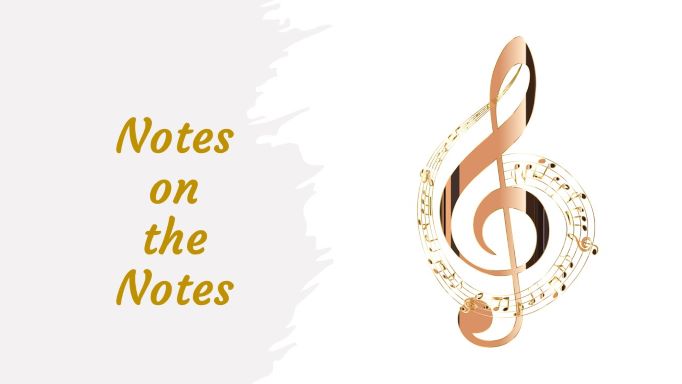Notes on the Notes – February 11, 2024

Transfiguration Sunday
This week’s music:
“Open My Eyes” (VU #371)
“Open my eyes, that I may see glimpses of truth thou hast for me;
place in my hand the wonderful key that shall unclasp and set me free.
Silently now I wait for thee, ready, my God, thy will to see.
Open my eyes, illumine me, Spirit Divine!
Open my ears, that I may hear voices of truth thou sendest clear;
and while the wave-notes fall on my ear, everything false will disappear.
Silently now I wait for thee, ready, my God, thy will to see.
Open my ears, illumine me, Spirit Divine!
Open my mouth, and let me bear gladly the warm truth everywhere;
open my heart and let me prepare love with thy children thus to share.
Silently now I wait for thee, ready, my God, thy will to see.
Open my heart, illumine me, Spirit divine!“
Clara H. Scott (1841-1897) provides us with a hymn of consecration that has been sung for over 100 years. The text of “Open My Eyes” was written in 1895 shortly before Scott’s death. Each stanza reveals an increasing receptiveness to the “Spirit divine.” Open eyes lead to “glimpses of truth.” Open ears lead to “voices of truth.” An open mouth leads to sharing the “warm truth everywhere.” An open heart leads to sharing “love to thy children.” On this Transfiguration Sunday, we open ourselves to hearing God’s word and letting it change and challenge us.
Sing along with the choir at First United Methodist Church in Valdosta, Georgia at: https://youtu.be/71jExPuxRBY
Hear The Praise Singers:
“And When You Call for Me” (MV #96)
“And when you call for me, I have already answered.
And when you call for me, I am already there.”
This sung introduction to prayer was written by Lynn Bauman in 2000, with music by Linnea Good (2004).
“Behold, Behold, I Make All Things” (MV #115)
“Behold, behold,
I make all things new, beginning with you
and starting from today.
Behold, behold,
I make all things new, my promise is true,
For I am Christ the way.”
Our response to the words of assurance was written by John L. Bell in 1995.
“We Have Come at Christ’s Own Bidding” (VU #104)
“We have come at Christ’s own bidding to this high and holy place,
Where we wait with hope and longing for some token of God’s grace.
Here we pray for new assurance that our faith is not in vain,
Searching like those first disciples for a sign both clear and plain.
Light breaks in upon our darkness; splendour bathes the flesh-joined Word;
Moses and Elijah marvel as the heavenly voice is heard.
Eyes and hearts behold with wonder how the Law and Prophets meet:
Christ, with garments drenched in brightness, stands transfigured and complete.
Strengthened by this glimpse of glory, fearful lest our faith decline,
We like Peter find it tempting to remain and build a shrine.
But true worship gives us courage to proclaim what we profess,
That our daily lives may prove us people of the God we bless.“
This transfiguration hymn is by Carl P. Daw, Jr. (1988). In his commentary on the text, Daw discusses the “comparison between the attitudes and assumptions of the disciples on the Mount of Transfiguration and the expectations of present-day Christians as they gather for worship.” The tune, ABBOT’S LEIGH, which was composed by British hymnologist Cyril Vincent Taylor in 1941.
Hear the tune on piano at: https://www.youtube.com/watch?v=mNPlsM14Bik
“Transfigure Us, O Lord”
“Transfigure us, O Lord,
Transfigure us, O Lord,
Break the chains that bind us;
Speak your healing word,
And where you lead we’ll follow.
Transfigure us, O Lord.
Down from heights of glory into the depths below,
The love of God self-emptied, the love of God to show.
You light the path before us, the way that we must go.
Light for those in darkness, the hungry have their fill,
Glad tidings for the humble, the healing of all ills;
In these we glimpse your glory, God’s promises fulfilled.
Transfigure us, O Lord…
Pardon for the sinner, a shepherd for the sheep,
A drink of living water for all who thirst and seek,
And feasting at your table, the lowly and the least.
To the holy city, Jerusalem, you go;
Your face set toward the ending, the cross to be your throne.
Shall we journey with you and share your Lenten road?
Transfigure us, O Lord…”
This week’s anthem is based on the transfiguration story as told in Matthew 17:1-9, Mark 9:2-10 and Luke 9:28b-36. It was written by Bob Hurd in 2002. The words imagine what we would have experienced if we had been present at the transfiguration and express our desire to be changed and challenged now by the presence of Christ.
“I Praise You, O God” (MV #61)
“I praise you, O God, with all of my heart.
With all the earth I will sing your praises.”
Our offering response for the season of Epiphany has words and music by David Robertson (2005) and was inspired by Psalm 138:1.
Hear this response at: https://www.youtube.com/watch?v=mLIH4X43Dxc
“O Splendour of God’s Glory Bright” (VU #413)
“O splendour of God’s glory bright, from light eternal bringing light;
O light of life, light’s living spring, true day, all days illumining;
Come, Holy Sun of heavenly love, pour down your radiance from above,
And to our inward hearts convey the Holy Spirit’s cloudless ray.
O joyful be the passing day with thoughts as clear as morning’s ray,
With faith like noon-tide shining bright, our souls unshadowed by the night.
O Christ, with each returning morn your image to our hearts is born;
O may we ever see anew our Saviour and our God in you!“
The text of this hymn comes from “Splendor Paternae Gloriae,” a hymn by Ambrose, Bishop of Milan (374-397 C.E.), who encouraged the development of hymn singing in the Western Church, having heard hymns sung during his travels in Greece. The translation is based on the work of John Chandler in Hymns of the Primitive Church (1837). The words reference both God and Jesus as being sources of divine light. Through the hymn, we are asking to be bathed in the divine light as we live our every day life. The tune, PUER NOBIS NASCITUR, is from a 15th-century Tier manuscript. It may be familiar as the tune for the hymn “A Little Child the Saviour Came” (VU #445).
Hear the tune on the organ at: https://www.youtube.com/watch?v=Wu-1qlh7YFU
“Go Now in Peace, Guided by the Light” (MV #211)
This commissioning and prayer for guidance was originally written in Spanish (“Vayan en paz”) by Pedro Rubalcava in 2002. It was arranged by Peter Kolar, also in 2002. As we end the season of Epiphany with the story of the transfiguration of Jesus, we ask again to be guided by Christ’s light as we go into the world.
“Go now in peace, guided by the light of Christ,
So you may be nourished by the Word of Life.”


You must be logged in to post a comment.